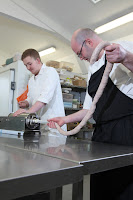We have been focusing on women in the church here in
England over the past 48 hours or so with debates about women bishops at the General Synod. I received a letter from Pam Wilding, the
Chair of the Florence Li Tim Oi Foundation asking us to think about women in
other parts of the world who do not have the chance of an education or any
voice in the church or in their society. Many would love to be able to train as
teachers, doctors, nurses, linguists, theologians, social workers. Many have
political aspirations to reform their own churches and societies. Li Tim Oi was the first ever woman priest in
the Anglican Communion. I know that I would not have spent the last 25 years doing what I'm doing if it were not for her! It may be that some churches or some individuals would
like to act on what Pam suggests in her letter below - if you want to share in this with others,
then do e mail me and I'll do my best to put you in touch. You can read the
stories of some women who have benefitted from education arranged through the
Li Tim Oi Foundation on http://www.ittakesonewoman.org/
 |
| The Revd Li Tim Oi |
Pam writes
A year of celebration!
This is an exciting year for England, with the London
Olympics and the Queen’s Diamond Jubilee! 2012 also marks the 20th anniversary
of the vote in General Synod to ordain women to the priesthood in the Church of
England. Since that vote, over 5,000 women have been ordained as priests, with
nearly 3,000 currently serving as licensed ministers. It is wonderful to
realise that now a whole generation of children has grown up in our Church with
women as clergy. Across the Anglican Communion there are many thousands more
ordained women, with a growing number of the 38 Provinces opening their orders
to women.
A long and winding road
Today we take this situation for granted, but women’s
journey to ordination has been long and difficult. It is easy to forget the
people who came before us and who took bold and courageous steps that helped to
make all our ordinations, and the ordination of other Anglican women, possible.
Most people do not know that the first Anglican woman to be ordained as a
priest was a Chinese woman by the name of Florence Li Tim-Oi, who was ordained
in 1944 in war-torn China by the Bishop of Hong Kong. Tim-Oi’s life reads like
an adventure story, with much heartache, twists and turns, before her priestly
ministry was finally accepted by the wider Church.
The challenge goes on
That was over 68 years ago, yet there are still places in
the Anglican Church that do not ordain women, and also, in some of the
provinces where women can be ordained, they do not have the resources. That’s why
the Li Tim-Oi Foundation exists – to make it possible for women to train for
ordained ministry, as well as for other Christian ministry. To date, the
Foundation has enabled hundreds of women in the developing world to be trained
for a wide variety of ministries, but there are so many more who long for the
opportunity to be trained. We have seen what a tremendous difference just one
educated Christian woman can make, and how she can become a catalyst for
empowering others in her church and community, working to end prejudice and
discrimination against women and harmful practices like female genital
mutilations.
The Revd Rose Mithamo from Kenya wrote to say, ‘I thank God
for the way he has helped you to think about women, who are despised, less
educated because of culture and who are seen as inferior and thus less
fortunate in society. Through your help many women have been uplifted and
trained, now having better chances of serving God in society.’
Susan Ameso from Uganda, writes ‘Thank you for blessing me
to bless others, for empowering me to empower others, and for giving me a sense
of worthiness and respect as a woman.’
It Takes One Woman
We are asking you to remember Florence Li Tim-Oi and the
many thousands of women who have showed such dedication, courage and
faithfulness in the past, by holding a thanksgiving service or taking a special
collection sometime this year. We owe so much to those who made it possible for
us to be ordained. Will you do what you can to help? We are asking you to raise
money and give what you can for those who are not able to test their calling.
Even a small amount will go a long way to empower another woman’s life.
It took one brave committed woman, Florence Li Tim-Oi, to
say yes to being a pioneer in the Anglican Church. Thanks to her, you and I
have been able to be ordained. Just think if we had been denied the opportunity
or if we had not had the resources? The best way of showing our gratitude is to
help transform the life of another woman. Please will you join me in helping to
do that?
If you would like
materials for use in worship, booklets, publicity leaflets, GiftAid envelopes,
bookmarks or other materials, please email mail to secretary@litim-oi.org





